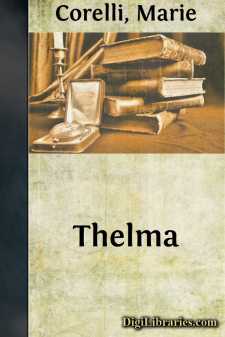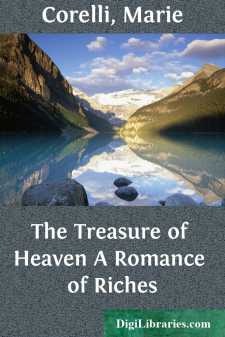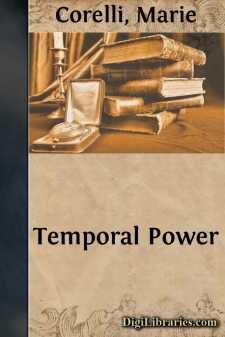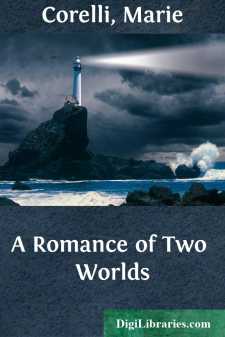Categories
- Antiques & Collectibles 13
- Architecture 36
- Art 48
- Bibles 22
- Biography & Autobiography 813
- Body, Mind & Spirit 141
- Business & Economics 28
- Children's Books 12
- Children's Fiction 9
- Computers 4
- Cooking 94
- Crafts & Hobbies 4
- Drama 346
- Education 46
- Family & Relationships 57
- Fiction 11826
- Games 19
- Gardening 17
- Health & Fitness 34
- History 1377
- House & Home 1
- Humor 147
- Juvenile Fiction 1873
- Juvenile Nonfiction 202
- Language Arts & Disciplines 88
- Law 16
- Literary Collections 686
- Literary Criticism 179
- Mathematics 13
- Medical 41
- Music 40
- Nature 179
- Non-Classifiable 1768
- Performing Arts 7
- Periodicals 1453
- Philosophy 64
- Photography 2
- Poetry 896
- Political Science 203
- Psychology 42
- Reference 154
- Religion 513
- Science 126
- Self-Help 83
- Social Science 81
- Sports & Recreation 34
- Study Aids 3
- Technology & Engineering 59
- Transportation 23
- Travel 463
- True Crime 29
Marie Corelli
Marie Corelli, a prominent British novelist in the late 19th and early 20th centuries, was born Mary Mackay in 1855. Her works, often blending romance, mysticism, and science fiction, gained immense popularity, with titles like "The Sorrows of Satan" (1895) becoming bestsellers. Despite critical disdain, Corelli's novels captivated a broad readership, making her one of the most widely read authors of her time.
Author's Books:
Sort by:
by:
Marie Corelli
CHAPTER I. It was the full "season" in Cairo. The ubiquitous Britisher and the no less ubiquitous American had planted their differing "society" standards on the sandy soil watered by the Nile, and were busily engaged in the work of reducing the city, formerly called Al Kahira or The Victorious, to a more deplorable condition of subjection and slavery than any old-world conqueror could...
more...
by:
Marie Corelli
CHAPTER I. I, who write this, am a dead man. Dead legally—dead by absolute proofs—dead and buried! Ask for me in my native city and they will tell you I was one of the victims of the cholera that ravaged Naples in 1884, and that my mortal remains lie moldering in the funeral vault of my ancestors. Yet—I live! I feel the warm blood coursing through my veins—the blood of thirty summers—the...
more...
by:
Marie Corelli
CHAPTER I."Dream by dream shot through her eyes, and eachOutshone the last that lighted."SWINBURNE. Midnight,—without darkness, without stars! Midnight—and the unwearied sun stood, yet visible in the heavens, like a victorious king throned on a dais of royal purple bordered with gold. The sky above him,—his canopy,—gleamed with a cold yet lustrous blue, while across it slowly flitted a...
more...
by:
Marie Corelli
CHAPTER I London,—and a night in June. London, swart and grim, semi-shrouded in a warm close mist of mingled human breath and acrid vapour steaming up from the clammy crowded streets,—London, with a million twinkling lights gleaming sharp upon its native blackness, and looking, to a dreamer's eye, like some gigantic Fortress, built line upon line and tower upon tower,—with huge ramparts...
more...
by:
Marie Corelli
CHAPTER I A cloud floated slowly above the mountain peak. Vast, fleecy and white as the crested foam of a sea-wave, it sailed through the sky with a divine air of majesty, seeming almost to express a consciousness of its own grandeur. Over a spacious tract of Southern California it extended its snowy canopy, moving from the distant Pacific Ocean across the heights of the Sierra Madre, now and then...
more...
by:
Marie Corelli
CHAPTER I THE KING'S PLEASAUNCE "In the beginning," so we are told, "God made the heavens and the earth." The statement is simple and terse; it is evidently intended to be wholly comprehensive. Its decisive, almost abrupt tone would seem to forbid either question or argument. The old-world narrator of the sublime event thus briefly chronicled was a poet of no mean quality, though...
more...
by:
Marie Corelli
CHAPTER I The old by-road went rambling down into a dell of deep green shadow. It was a reprobate of a road,—a vagrant of the land,— having long ago wandered out of straight and even courses and taken to meandering aimlessly into many ruts and furrows under arching trees, which in wet weather poured their weight of dripping rain upon it and made it little more than a mud pool. Between straggling...
more...
by:
Marie Corelli
PROLOGUE. We live in an age of universal inquiry, ergo of universal scepticism. The prophecies of the poet, the dreams of the philosopher and scientist, are being daily realized—things formerly considered mere fairy-tales have become facts—yet, in spite of the marvels of learning and science that are hourly accomplished among us, the attitude of mankind is one of disbelief. "There is no...
more...









